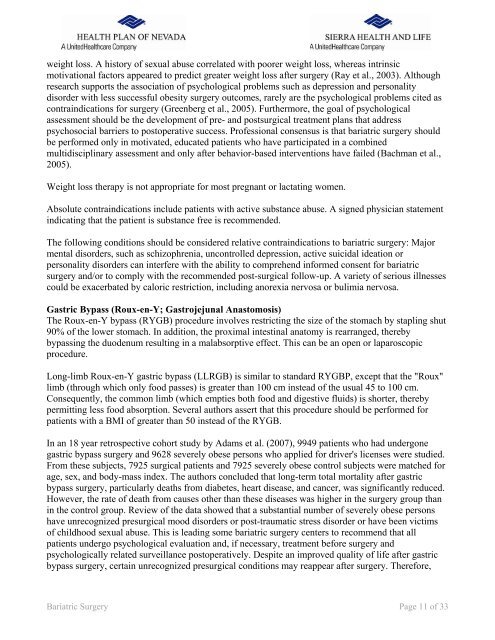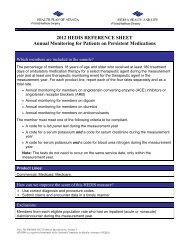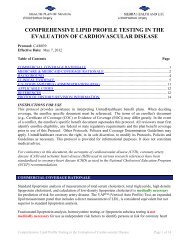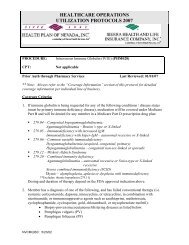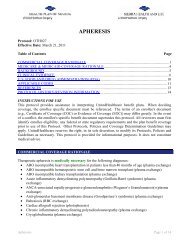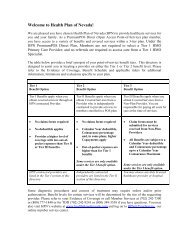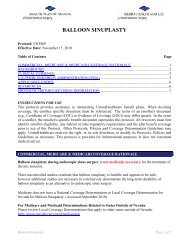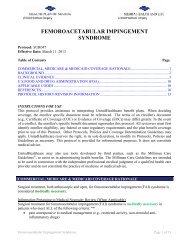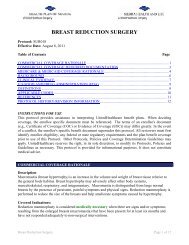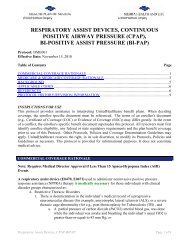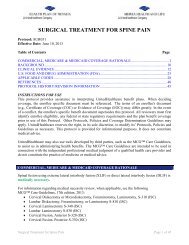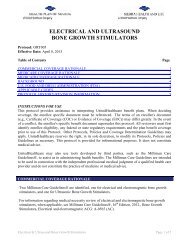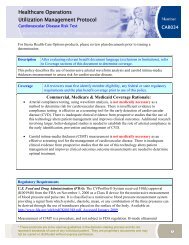BARIATRIC SURGERY - Health Plan of Nevada
BARIATRIC SURGERY - Health Plan of Nevada
BARIATRIC SURGERY - Health Plan of Nevada
Create successful ePaper yourself
Turn your PDF publications into a flip-book with our unique Google optimized e-Paper software.
weight loss. A history <strong>of</strong> sexual abuse correlated with poorer weight loss, whereas intrinsic<br />
motivational factors appeared to predict greater weight loss after surgery (Ray et al., 2003). Although<br />
research supports the association <strong>of</strong> psychological problems such as depression and personality<br />
disorder with less successful obesity surgery outcomes, rarely are the psychological problems cited as<br />
contraindications for surgery (Greenberg et al., 2005). Furthermore, the goal <strong>of</strong> psychological<br />
assessment should be the development <strong>of</strong> pre- and postsurgical treatment plans that address<br />
psychosocial barriers to postoperative success. Pr<strong>of</strong>essional consensus is that bariatric surgery should<br />
be performed only in motivated, educated patients who have participated in a combined<br />
multidisciplinary assessment and only after behavior-based interventions have failed (Bachman et al.,<br />
2005).<br />
Weight loss therapy is not appropriate for most pregnant or lactating women.<br />
Absolute contraindications include patients with active substance abuse. A signed physician statement<br />
indicating that the patient is substance free is recommended.<br />
The following conditions should be considered relative contraindications to bariatric surgery: Major<br />
mental disorders, such as schizophrenia, uncontrolled depression, active suicidal ideation or<br />
personality disorders can interfere with the ability to comprehend informed consent for bariatric<br />
surgery and/or to comply with the recommended post-surgical follow-up. A variety <strong>of</strong> serious illnesses<br />
could be exacerbated by caloric restriction, including anorexia nervosa or bulimia nervosa.<br />
Gastric Bypass (Roux-en-Y; Gastrojejunal Anastomosis)<br />
The Roux-en-Y bypass (RYGB) procedure involves restricting the size <strong>of</strong> the stomach by stapling shut<br />
90% <strong>of</strong> the lower stomach. In addition, the proximal intestinal anatomy is rearranged, thereby<br />
bypassing the duodenum resulting in a malabsorptive effect. This can be an open or laparoscopic<br />
procedure.<br />
Long-limb Roux-en-Y gastric bypass (LLRGB) is similar to standard RYGBP, except that the "Roux"<br />
limb (through which only food passes) is greater than 100 cm instead <strong>of</strong> the usual 45 to 100 cm.<br />
Consequently, the common limb (which empties both food and digestive fluids) is shorter, thereby<br />
permitting less food absorption. Several authors assert that this procedure should be performed for<br />
patients with a BMI <strong>of</strong> greater than 50 instead <strong>of</strong> the RYGB.<br />
In an 18 year retrospective cohort study by Adams et al. (2007), 9949 patients who had undergone<br />
gastric bypass surgery and 9628 severely obese persons who applied for driver's licenses were studied.<br />
From these subjects, 7925 surgical patients and 7925 severely obese control subjects were matched for<br />
age, sex, and body-mass index. The authors concluded that long-term total mortality after gastric<br />
bypass surgery, particularly deaths from diabetes, heart disease, and cancer, was significantly reduced.<br />
However, the rate <strong>of</strong> death from causes other than these diseases was higher in the surgery group than<br />
in the control group. Review <strong>of</strong> the data showed that a substantial number <strong>of</strong> severely obese persons<br />
have unrecognized presurgical mood disorders or post-traumatic stress disorder or have been victims<br />
<strong>of</strong> childhood sexual abuse. This is leading some bariatric surgery centers to recommend that all<br />
patients undergo psychological evaluation and, if necessary, treatment before surgery and<br />
psychologically related surveillance postoperatively. Despite an improved quality <strong>of</strong> life after gastric<br />
bypass surgery, certain unrecognized presurgical conditions may reappear after surgery. Therefore,<br />
Bariatric Surgery Page 11 <strong>of</strong> 33


